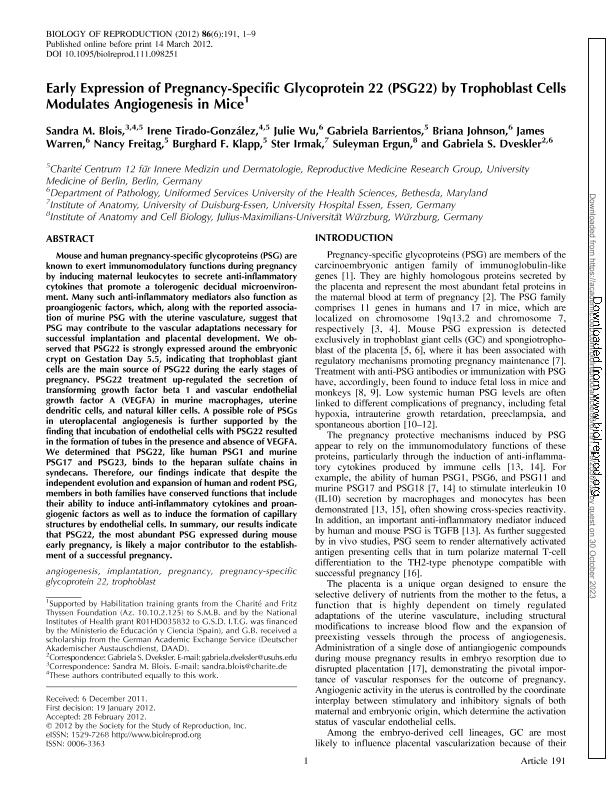Artículo
Early expression of pregnancy-specific glycoprotein 22 (PSG22) by trophoblast cells modulates angiogenesis in mice.
Blois, Sandra M.; Tirado González, Irene; Wu, Julie; Barrientos, Gabriela Laura ; Johnson, Briana; Warren, James; Freitag, Nancy; Klapp, Burghard F.; Irmak, Ster; Ergun, Suleyman; Dveskler, Gabriela S.
; Johnson, Briana; Warren, James; Freitag, Nancy; Klapp, Burghard F.; Irmak, Ster; Ergun, Suleyman; Dveskler, Gabriela S.
 ; Johnson, Briana; Warren, James; Freitag, Nancy; Klapp, Burghard F.; Irmak, Ster; Ergun, Suleyman; Dveskler, Gabriela S.
; Johnson, Briana; Warren, James; Freitag, Nancy; Klapp, Burghard F.; Irmak, Ster; Ergun, Suleyman; Dveskler, Gabriela S.
Fecha de publicación:
06/2012
Editorial:
Society for the Study of Reproduction
Revista:
Biology Of Reproduction (online)
ISSN:
0006-3363
Idioma:
Inglés
Tipo de recurso:
Artículo publicado
Clasificación temática:
Resumen
Mouse and human pregnancy-specific glycoproteins (PSG) are known to exert immunomodulatory functions during pregnancy by inducing maternal leukocytes to secrete anti-inflammatory cytokines that promote a tolerogenic decidual microenvironment. Many such anti-inflammatory mediators also function as proangiogenic factors, which, along with the reported association of murine PSG with the uterine vasculature, suggest that PSG may contribute to the vascular adaptations necessary for successful implantation and placental development. We observed that PSG22 is strongly expressed around the embryonic crypt on Gestation Day 5.5, indicating that trophoblast giant cells are the main source of PSG22 during the early stages of pregnancy. PSG22 treatment up-regulated the secretion of transforming growth factor beta 1 and vascular endothelial growth factor A (VEGFA) in murine macrophages, uterine dendritic cells, and natural killer cells. A possible role of PSGs in uteroplacental angiogenesis is further supported by the finding that incubation of endothelial cells with PSG22 resulted in the formation of tubes in the presence and absence of VEGFA. We determined that PSG22, like human PSG1 and murine PSG17 and PSG23, binds to the heparan sulfate chains in syndecans. Therefore, our findings indicate that despite the independent evolution and expansion of human and rodent PSG, members in both families have conserved functions that include their ability to induce anti-inflammatory cytokines and proangiogenic factors as well as to induce the formation of capillary structures by endothelial cells. In summary, our results indicate that PSG22, the most abundant PSG expressed during mouse early pregnancy, is likely a major contributor to the establishment of a successful pregnancy.
Archivos asociados
Licencia
Identificadores
Colecciones
Articulos(OCA CIUDAD UNIVERSITARIA)
Articulos de OFICINA DE COORDINACION ADMINISTRATIVA CIUDAD UNIVERSITARIA
Articulos de OFICINA DE COORDINACION ADMINISTRATIVA CIUDAD UNIVERSITARIA
Citación
Blois, Sandra M.; Tirado González, Irene; Wu, Julie; Barrientos, Gabriela Laura; Johnson, Briana; et al.; Early expression of pregnancy-specific glycoprotein 22 (PSG22) by trophoblast cells modulates angiogenesis in mice.; Society for the Study of Reproduction; Biology Of Reproduction (online); 86; 6; 6-2012; 1-9
Compartir
Altmétricas



